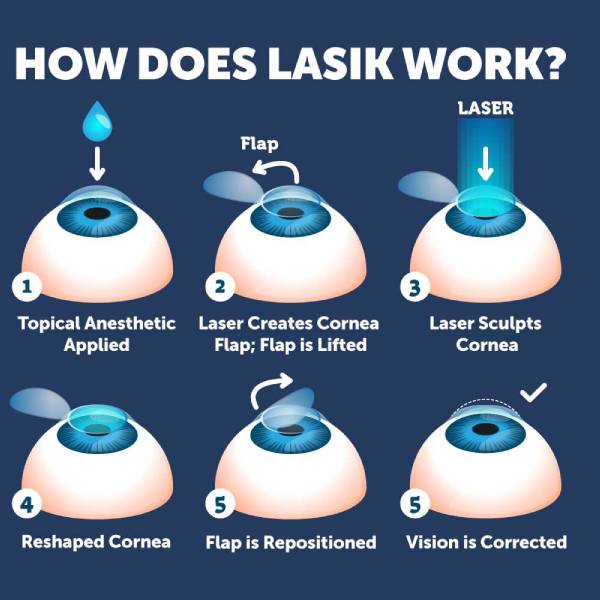Cornea and Lasik Eye Surgeon Specialist & Opthalmologist in Dombivali

Lasik & Refractive Surgery
LASIK (laser-assisted in situ keratomileusis) is a type of refractive surgery that is used to correct vision problems, such as nearsightedness, farsightedness, and astigmatism. In LASIK surgery, a laser is used to reshape the cornea, the clear, dome-shaped surface at the front of the eye, to improve the way that light enters the eye and is focused onto the retina. This can help to improve vision and reduce or eliminate the need for glasses or contact lenses.
Refractive surgery is a term that refers to any surgical procedure that is used to correct vision problems by changing the shape of the cornea or the lens of the eye. In addition to LASIK, other types of refractive surgery include photorefractive keratectomy (PRK), which uses a laser to reshape the cornea.
Refractive surgery can be an effective way to improve vision and reduce or eliminate the need for glasses or contact lenses. However, it is important to discuss the benefits and risks of these procedures with a qualified healthcare provider to determine if they are the right option for you.
LASIK and other forms of refractive surgery can offer several benefits for people with vision problems, including:
- Improved vision : LASIK and other refractive surgeries can help to improve vision by reshaping the cornea or lens of the eye to correct refractive errors. This can reduce or eliminate the need for glasses or contact lenses and can improve overall visual acuity.
- Convenience : After LASIK or other refractive surgery, most people are able to see clearly without the need for glasses or contact lenses. This can be more convenient and allow for a greater range of activities and lifestyle choices.
- Enhanced safety : LASIK and other refractive surgeries are typically safe and effective, and the risks of complications are low. In addition, LASIK does not require the use of stitches or other foreign objects in the eye, which can reduce the risk of infection or other complications.
- Improved appearance : For people who are self-conscious about wearing glasses or contact lenses, LASIK and other refractive surgeries can help to improve their appearance and boost their confidence.
Overall, LASIK and other forms of refractive surgery can be an effective way to improve vision and enhance quality of life for people with vision problems. It is important to discuss the benefits and risks of these procedures with a qualified healthcare provider to determine if they are right for you.
An ideal candidate for LASIK surgery is someone who:
- Is at least 18 years old : LASIK is typically not performed on people under the age of 18 because the shape of the cornea can continue to change until the late teenage years.
- Has stable vision : LASIK is most effective for people who have stable vision and do not experience significant changes in their prescription for glasses or contact lenses.
- Has healthy eyes : LASIK is not recommended for people with certain eye conditions, such as advanced glaucoma, severe dry eye, or cataracts. It is important to have a comprehensive eye examination to determine if you are a good candidate for LASIK.
- Has realistic expectations : LASIK can improve vision, but it will not necessarily provide perfect vision. It is important to have realistic expectations about the potential benefits and limitations of LASIK surgery.
If you are interested in LASIK surgery, it is important to discuss your specific situation with a qualified healthcare provider who can help you determine if you are an ideal candidate for the procedure.
Copyright © All Rights Reserved, By Dr Vidya Bawkar
 WhatsApp
WhatsApp